Singleton
One of the simplest design patterns is the Singleton. The purpose of Singleton design pattern is to always have a single instance of a some class. Singletons are usually used for things you don't necessarily need multiple instances of such as database or logging or similar. You always work with same instance of a singleton object.
This is how you create a singleton:
class MySingleton
{
public static function getInstance()
{
static $instance;
if (null === $instance) {
$instance = new self();
}
return $instance;
}
// prevent creating multiple instances due to "private" constructor
private function __construct(){}
// prevent the instance from being cloned
private function __clone(){}
// prevent from being unserialized
private function __wakeup(){}
}
Usage:
$instance = MySingleton::getInstance();
Following the same pattern, you can create your own singletons and add any necessary functionality you want. The main trick here is that we have made the constructor private which is what disallows creation of multiple instances of singleton class.
It is important to point out that Singleton design pattern is considered anti-pattern (and more so in the world of PHP) because of following reasons:
- Singletons create global state which is bad; they create tight-coupling
- Singletons are essentially class-oriented not object-oriented
- We cannot tell what dependencies it contains, it hides logic
- Because you cannot create multiple instances, you cannot easily test them
- PHP runs on shared nothing architecture which essentially means unlike other languages like Java/.Net, life of a PHP application is just one http request which is why singletons do not make much sense in PHP
Having said that, many argue that you can at least use singletons for single-nature things like an instance of database or logging (though it is matter of personal preference on how you design database or logging stuff) while others avoid singletons completely (especially TDD Worshipers).
That's all there is to a singleton.
Multiton
As the name suggests, a multiton is a design pattern that helps you create multiple instances of itself. Both singleton and multiton are same, the only difference is that a multiton can store and retrieve multiple instances of itself. Obviously multiton suffers from same problems as singletons.
Here is example of multiton:
class Logger
{
private static $instances = array();
public static function getInstance($key)
{
if(!array_key_exists($key, self::$instances)) {
self::$instances[$key] = new self();
}
return self::$instances[$key];
}
// prevent creating multiple instances due to "private" constructor
private function __construct(){}
// prevent the instance from being cloned
private function __clone(){}
// prevent from being unserialized
private function __wakeup(){}
}
Usage:
$firstInstance = Logger::getInstance('file');
$secondInstance = Logger::getInstance('email');





Top comments (0)